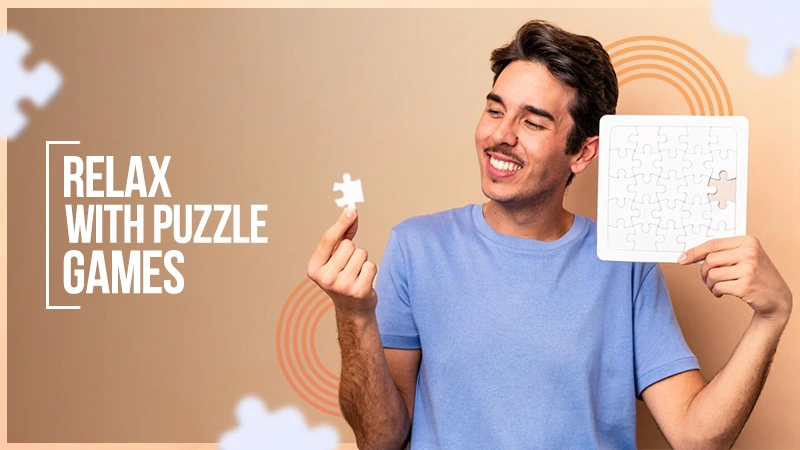What better way to relax after a stressful day at work than solving exciting puzzle games? Various studies prove that engaging puzzles can offer several cognitive benefits, including improved memory, problem-solving skills, and attention, potentially reducing the risk of cognitive decline and enhancing overall brain function. (Progress Lifeline: Benefits of Puzzles)
Now, some of you might be wondering about the relationship between solving puzzles, cognitive development, and relaxation. No, I am not throwing blind darts; these things are actually interconnected.
Don’t believe me? In this post, we will dive deeper into the mental benefits associated with puzzle games. So, continue reading to learn more!
KER TAKEAWAYS
- Puzzles offer a range of cognitive challenges that stimulate the brain and sharpen various cognitive skills across the board.
- They also serve as a relaxing sanctuary for those seeking refuge in the chaos of their lives.
- Puzzles can be of various types; some of the most preferred ones include Jigsaw, Sudoku, and Crosswords.
- Such games provide a variety of benefits, such as improving memory, boosting problem-solving skills, promoting social interaction, enhancing spatial awareness, and reducing stress levels.
- To build a habit and incorporate puzzle-solving in your routine, start with brief sessions each day, or try solving with your family.
The Benefits of Puzzle Games
Puzzle games have been a favorite pastime for countless individuals across the globe, capturing their imagination and interest for an array of compelling reasons. These games are not just an entertainment medium but also serve as powerful mental exercises that can be easily woven into anyone’s daily routine.
They offer a rich tapestry of cognitive challenges, stimulating the brain and sharpening skills across the board. Besides contributing to enhancing mental acuity, they enrich social interactions when shared in group settings and create bridges between people with common goals and interests.
Their impact extends beyond cognitive skill-building since they serve as a sanctuary for those seeking refuge from their chaotic routine lives, allowing for significant stress reduction and relaxation.
Digital platforms like https://www.pennydellpuzzles.com/ have made accessing a wide variety of puzzles easier, presenting a treasure chest full of options to stimulate the mind and soothe the soul.
Jigsaw puzzles are extremely famous all around the world. Apart from the entertainment aspect, these offer a variety of benefits, as you can observe from the infographics below:

How Puzzles Enhance Cognitive Skills
There is a profound and multifaceted connection between puzzles and cognitive enhancements. The following points will help you understand the statement.
- Engaging in puzzle-solving activities regularly acts as a mental fitness regimen and fortifies the mind, just like physical exercise conditions the body.
- In support of this, many scientific studies revealed that solving puzzles boosts the brain’s ability to reshape and adapt in response to new learning experiences.
- Puzzles promote memory retention, sharpen focus, and enhance spatial reasoning, enabling a more powerful problem-solving approach.
- They stimulate the release of the ‘feel-good’ neurotransmitter dopamine, which plays an important part in improving mood, managing stress, and fostering motivation. This creates a positive feedback loop that cultivates continuous engagement with these beneficial activities.
As highlighted by Harvard Health, the points above prove that brain exercises maintain and improve cognitive function, especially as we age.
Using Puzzles for Stress Relief
We are living in a fast-paced society where stress and anxiety are not uncommon occurrences. Which makes it even more important to find strategies for mental relaxation.
This tranquility can be effectively achieved through puzzles. The act of solving a puzzle demands a focused mind, distracting it from the problems and pressures of the external world.
This promotes a state of relaxation, similar to that of the soothing effects of meditation, alleviating anxiety and allowing clearer, more harmonious thought processes to develop.
Such games act as a mental reset button and shift the focus from stress-inducing thoughts to structured, rational ones; this improves clarity and well-being.
Popular Types of Puzzles
There are numerous types of puzzles available, each offering unique challenges and benefits. Some of the celebrated ones are crosswords, Sudoku, and jigsaw puzzles.
- Crossword puzzles are extremely useful for enhancing vocabulary and engaging language centers in the brain. Solving crosswords on a regular basis can help expand one’s verbal reasoning and linguistic skills dramatically.
- Sudoku is best for boosting logical reasoning and pattern recognition skills. It sharpens the mind’s ability to identify solutions amidst seemingly unrelated numbers, cultivating a heightened sense of analytical thinking.
- Jigsaw puzzles require a detailed visual analysis, stimulating spatial reasoning. It improves short-term memory and attention to detail. This caters to different preferences and abilities and keeps boredom and mindfulness at bay.
FUN FACT
The first jigsaw puzzle, a “dissected map” for teaching geography, was created in 1767 by British mapmaker John Spilsbury.
Incorporating Puzzles into Your Routine
Solving puzzles should not feel like an arduous task. A brief session every day significantly impacts mental wellness and engagement. It’s up to you whether you wish to start the day on a high note or provide a soothing wind-down before going to sleep. These enigmas only require a modest time investment to yield substantial results.
Additionally, solving puzzles together with family members or friends can foster a collaborative environment, delivering fun, creativity, and companionship. This can become a new bonding activity to strengthen relationships and introduce exciting challenges that encourage joint problem-solving skills.
Final Thoughts on Puzzle Games
Puzzle games are the perfect choice for engaging your brain and relaxing at the same time. It offers immediate satisfaction and long-term cognitive benefits. If you wish to foster creativity, resilience, and clarity while relieving stress and enhancing your mental acuity, consider integrating these games into your life.
It doesn’t matter if you’re a novice or a seasoned aficionado; incorporating puzzle games into your lifestyle will surely prove to be a rewarding journey worth embarking upon.
Frequently Asked Questions
1. How do puzzle games help the brain?
Ans: By enhancing the function of the prefrontal cortex (the part of the brain associated with cognitive abilities), puzzle games help stimulate the brain.
2. Do puzzles increase brain power?
Ans: Various studies prove that brain training puzzle activities play an important part in increasing brain power or cognitive abilities.
3. Can puzzles help you relax?
Ans: Puzzles require concentration and focus and can prove to be a relaxing activity, serving as a getaway from the chaos of life.
4. Which game is the best for brain power?
Ans: Games like chess, Sudoku, jigsaw puzzles, and crosswords are best for enhancing brain power.





